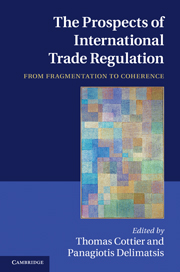Book contents
- Frontmatter
- Contents
- List of figures
- List of tables
- Contributors
- Preface and acknowledgements
- Table of cases
- List of abbreviations
- Introduction: fragmentation and coherence in international trade regulation: analysis and conceptual foundations
- PART I Constitutional issues in international trade regulation
- 1 The constitutionalisation of international trade law
- 2 Reflections on modes of decision-making in the World Trade Organization
- 3 Regionalism: moving from fragmentation towards coherence
- PART II Reforming specific areas of trade regulation
- PART III ‘Trade and…’ linkages
- Index
- References
3 - Regionalism: moving from fragmentation towards coherence
from PART I - Constitutional issues in international trade regulation
Published online by Cambridge University Press: 26 April 2011
- Frontmatter
- Contents
- List of figures
- List of tables
- Contributors
- Preface and acknowledgements
- Table of cases
- List of abbreviations
- Introduction: fragmentation and coherence in international trade regulation: analysis and conceptual foundations
- PART I Constitutional issues in international trade regulation
- 1 The constitutionalisation of international trade law
- 2 Reflections on modes of decision-making in the World Trade Organization
- 3 Regionalism: moving from fragmentation towards coherence
- PART II Reforming specific areas of trade regulation
- PART III ‘Trade and…’ linkages
- Index
- References
Summary
KEY MESSAGES: THREE FACTS AND AN IMPLICATION
∙ Fact 1: The world trade system is marked by a motley assortment of discriminatory trade agreements known as the ‘Spaghetti Bowl’.
∙ Fact 2: Regionalism is here to stay. Trade agreements will continue to proliferate even after the current trade round meanders to a conclusion.
∙ Fact 3: This tangle of trade deals is a sub-optimal way to organise world trade. The discrimination inherent in regionalism is economically inefficient and the costs rise as manufacturing becomes ever more internationalised and supply chains grow across national borders.
Regionalism is also unfair. While the spaghetti bowl is a problem for firms in big nations, it is much more of a problem for firms in poor nations. Rich nations have the resources and negotiating leverage to navigate the tangle's worst effects. The governments of small and poor nations do not. The spaghetti bowl falls much harder on the heads of the world's small and poor nations.
Implication: As the spaghetti bowl's inefficiencies are increasingly magnified, the world must find a solution. Since regionalism is here to stay, the solution must work with existing regional arrangements, not against it. The solution must be to multilateralise regionalism.
Introduction
The World Trade Organization (WTO)-centric world trade system is principled and rules-based, yet flexible enough to embrace the vast range of realities facing nations across the planet. The key principle – Article I of the General Agreement on Tariffs and Trade (GATT) – is non-discrimination.
- Type
- Chapter
- Information
- The Prospects of International Trade RegulationFrom Fragmentation to Coherence, pp. 136 - 166Publisher: Cambridge University PressPrint publication year: 2011
References
- 1
- Cited by



